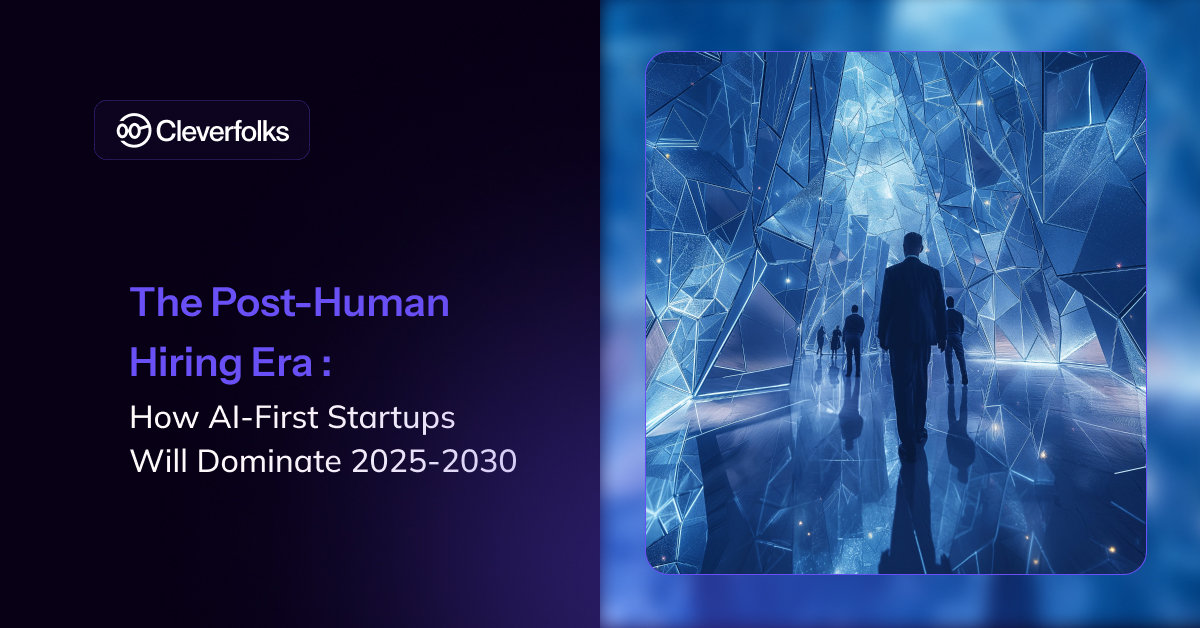The traditional hiring playbook is dead. While legacy companies debate AI adoption, a new breed of startups is quietly building teams where AI agents work alongside, or in place of, human employees from day one. With 73% of organizations worldwide already using or piloting AI in core functions, the window for transformation is rapidly closing.
The $107 Billion Reality Check
The numbers don’t lie. In 2025, $107 billion flowed into AI startups globally representing 26% of all venture capital funding. This isn’t speculative money chasing trends; it’s strategic capital flowing toward companies that understand a fundamental shift in organizational design.

While Fortune 500 companies struggle with diversity quotas and lengthy interview processes, AI-first startups are solving the same problems with a fraction of the overhead. The math is brutal: where traditional companies burn through $200K+ annually per skilled professional, AI-first startups achieve equivalent output for $30K in AI infrastructure and one human supervisor.
The Job Creation Paradox
The World Economic Forum’s latest data reveals a surprising truth: AI will create 97 million jobs globally while displacing 85 million, a net gain of 12 million positions. But these aren’t the same jobs being reshuffled. They’re entirely new categories that didn’t exist five years ago.

The Speed Advantage: Real Numbers
With over 4 billion prompts issued daily across major LLM platforms, the velocity of AI-first operations is unprecedented. Companies like Klarna reduced customer support volume by 66% using AI assistants, while Morgan Stanley deployed GPT-4 to power knowledge assistants for financial advisors.

The Infrastructure Revolution
AI-first startups don’t just use AI tools, they build their entire operational infrastructure around AI capabilities. Over 60% of enterprise SaaS products now have embedded AI features, but AI-first companies go deeper: their hiring processes, performance metrics, communication protocols, and even company culture assume AI integration from the ground up.

Traditional companies trying to “add AI” to existing workflows face the same challenge as companies trying to “add mobile” in 2010. The winners weren’t those who created mobile apps for desktop processes, they were those who rethought their entire business model around mobile-first experiences.
The Talent Geography Shift
The concentration of AI talent tells a revealing story. While the United States and India account for over 50% of the global AI workforce, AI-first startups are recruiting from unexpected places and creating new talent hubs.

The most interesting AI-first startups aren’t competing for traditional tech talent. They’re recruiting from unexpected places: former teachers who understand learning systems, ex-military personnel who grasp human-machine coordination, and liberal arts graduates who can bridge the gap between human creativity and AI capability.
This creates a talent arbitrage where AI-first companies can build world-class teams without competing in the traditional Silicon Valley bidding wars.
The 2025–2030 Projection: A $1.81 Trillion Future
The AI market is projected to reach $1.81 trillion by 2030, growing at a 35.9% CAGR The maturation of AI-first organizational models drives this expansion The maturation of AI-first organizational models drives this expansion faster than the cloud computing boom of the 2010s. The maturation of AI-first organizational models drives this expansion.

Key milestones on the horizon:
- 2026: Over 95% of customer support interactions will involve AI
- 2027: Sovereign AI models launched in at least 25 countries
- 2028: AI-generated scientific papers will outpace human-authored papers
- 2030: AI will contribute more than $15.7 trillion to global GDP
By 2030, the most valuable startups will be those that never had to “transition” to AI, they were born AI-native. These companies will have five-year head starts in human-AI collaboration, operational efficiency, and scaling patterns that traditional companies simply cannot match.
The post-human hiring era isn’t about eliminating humans from the workforce. It’s about creating organizations where human creativity and AI capability are so deeply integrated that they become indistinguishable from each other.
The question isn’t whether AI will dominate hiring, it’s whether your startup will be ready when it does.
